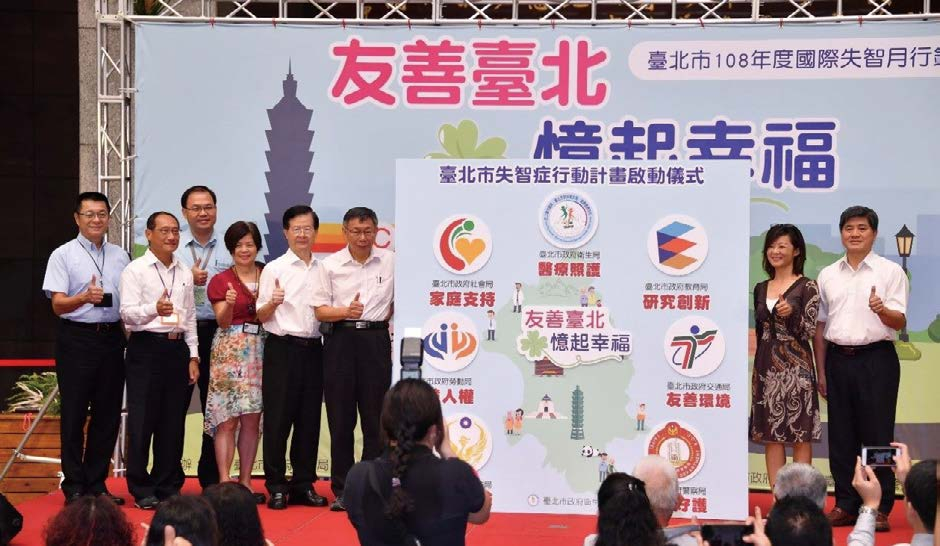With “healthy city” and “safe Taipei” as the core concept, strength encommunity medical care, social security, and health risk management by establishing local health care, reinforce substance abuse prevention and treatment, suicide prevention, and road traffic accident road traffic injury prevention. Consolidate cross-department and non-government resources,provide diversified programs and comprehensive response measures, to ensure healthy lives of the people and promote well-being for all at all ages.
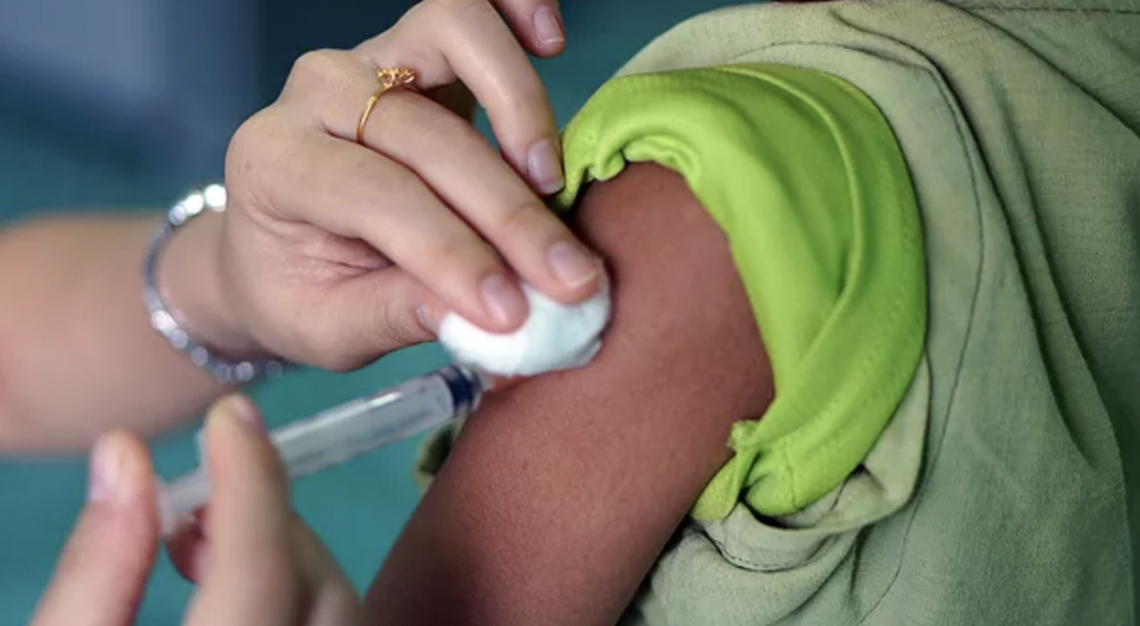
By 2030, reduce by one third premature mortality from non-communicable
diseases through prevention and treatment and promote mental health and well-being.

Strengthen the prevention and treatment of substance abuse, including narcotic drug abuse and harmful use of alcohol.
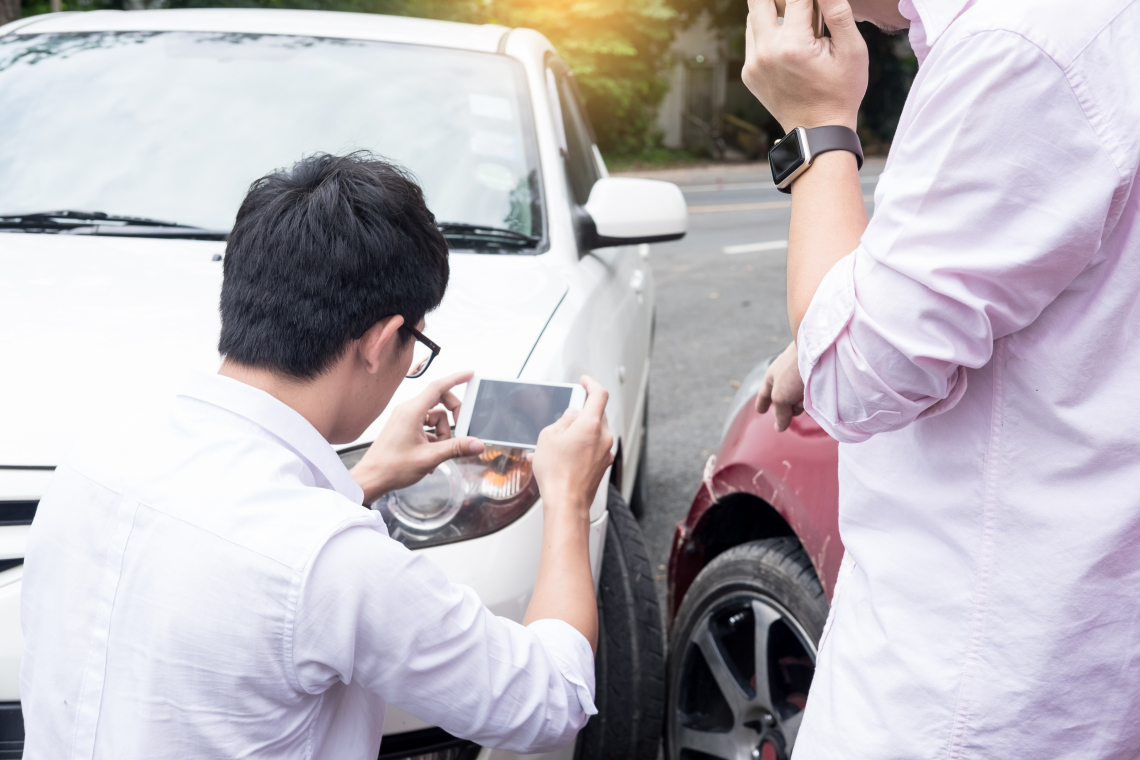
By 2020, halve the number of global deaths and injuries from road traffic accidents.

Support the research and development of vaccines and medicines for the communicable and noncommunicable diseases that primarily affect developing countries, provide access to affordable essential medicines and vaccines, in accordance with the Doha Declaration on the TRIPS Agreement and Public Health, which affirms the right of developing countries to use to the full the provisions in the Agreement on Trade Related Aspects of Intellectual Property Rights regarding flexibilities to protect public health, and, in particular, provide access to medicines for all.

Substantially increase health financing and the recruitment, development, training and retention of the health workforce in developing countries, especially in least developed countries and small island developing States.
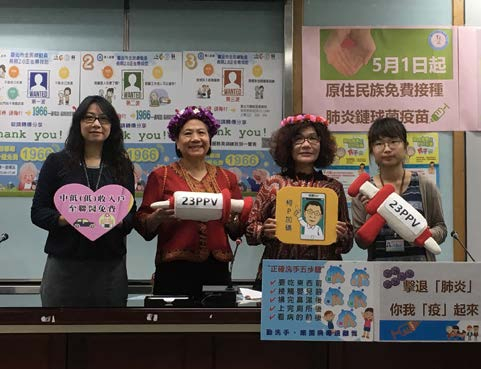
Continue with the subsidization of influenza vaccination, rotavirus, pneumococcal and routine vaccines to enhance the protection for infants, school-age children, the disadvantaged, the elderly and high-risk groups. In 2019, the subsidization target for pneumococcal vaccines expanded to include indigenous peoples aged 55 and 64, to maintain a high vaccination rate and increase herd immunity. Meanwhile, new vaccination programs are gradually introduced to maintain the health of the citizens and to lower the threat from diseases.
Create a friendly environment for childrearing; create diversified fairpriced childcare service models to lessen the burden on parents bringing up and caring for children, so to encourage people of marriageable, childrearing age to have children. In 2019, the City organized 21 government-instituted, privately operated infant daycare centers, 53 public infant daycare centers, 165 private infant daycare centers and 4,144 home babysitters with the capacity to provide childcare services to 9,902 infants; the coverage for children under two years old was 22.93% (out of total 43,183) for the City.
At the same time, continue with the promotion of the new quasipublic childcare system, through public-private partnership strategies, incorporate quality private infant daycare centers and babysitters, to provide quality and fair-priced childcare services. The supply ratio for public and quasi-public centers reached 72.72% in 2019.
Also in 2019, the City took the lead in planning for subsidy extensions for children aged two to three and respect the children’s differential development needs. When the child reaches two years old, regardless of home babysitter, public or private infant daycare or family care, parents can continue to receive friendly childcare subsidization and assisting childcare allowance, which substantially decreases the parents’ burden on childcare. Depending on the type of childcare and the order of child born, varying degrees of additional subsidy ranging from NT$4,500 to NT$12,000 are provided, so that parents can send children to childcare and join the workforce with a peace of mind.
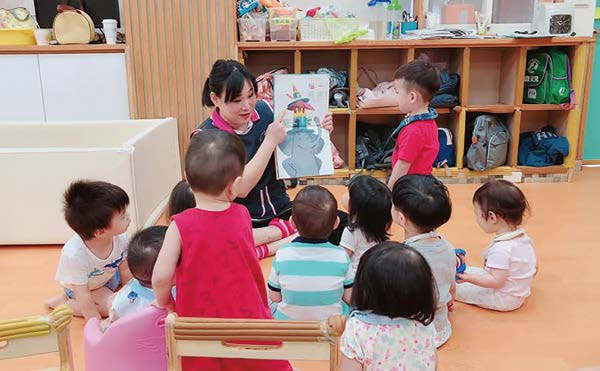
Upgrade the administration level of suicide prevention. Consolidate cross-department and nongovernment resources, and establish municipal-level suicide prevention and treatment centers in order to create an intricate network of suicide prevention to effectively prevent suicidal behaviors. Through health education publicity campaigns, continually upgrade the professional knowledge and skills of suicide prevention workers. In 2019, a total of 129 sessions of suicide prevention courses were arranged with 10,233 attendances; the website had accumulated 127,966 page views.
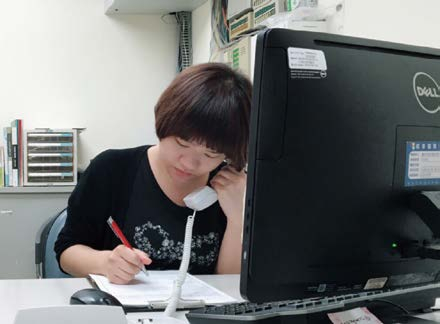
Combining forces with professional private institutions, enhance care services and extend visiting services for individuals with suicidal attempts and high risk cases. Up to 7,051 suicide notification cases were received and the care visit rate reached 99.7% in 2019.To prevent suicide and self-harm from jumping off high structures, the “Safety Manual for Falling Prevention” was published, at the same time, fortify falling prevention from buildings in communities and limit the access of lethal tools.
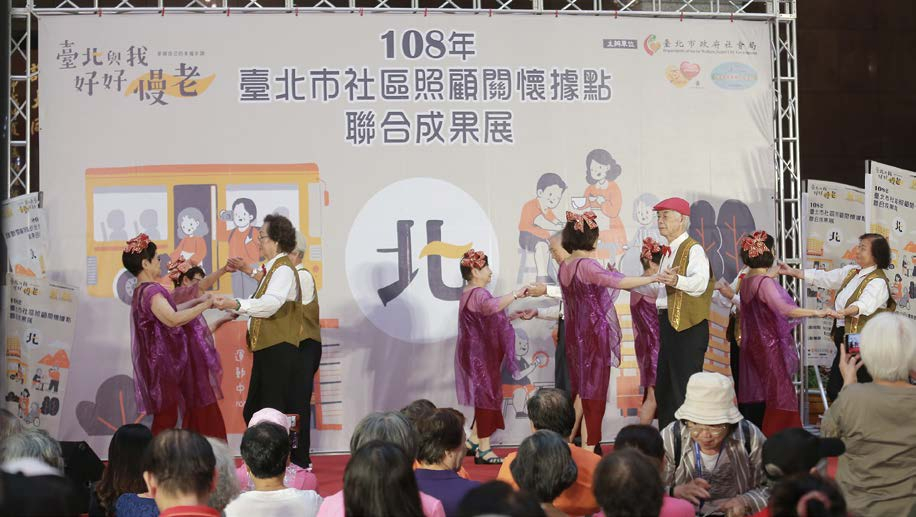
The City’s senior population is increasing rapidly. Ranking No. 1 among metropolitan counties and cities in Taiwan. In an effort to encourage the elderly to continue promoting and enhancing social participation to either prevent or delay aging, the City subsidizes willing and energetic units in various communities to operate elderly activity centers.

Through providing local services in the community, relevant welfare resources are integrated. Diversified services such as care visits, phone greets and consultations, and referral services, meal services, and health promotions are provided to establish a continuous care system. Through subsidizing private organizations, in the bottom-up approach with substantial participation with citizens by creating safe communities with voluntary guardians of the elderly, to ensure the safety and health ofthe aged people, thereby improving the quality their lives.
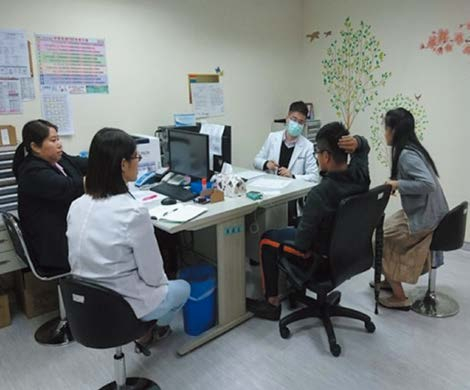
Develop all-round services and multiple contingencies, consolidate relevant departments and develop prevention strategies to reduce the likelihood of relapse from substance use in the underaged. The Department of Education has deployed three tiers of preventive and treatment measures in schools: prevention educational campaigns, urine screening, substance abuse counseling, to prevent substance abuse. The Police Department has reinforced the investigation of drug crimes, while the Juvenile Counseling Section of the Juvenile Affairs Division oversees of juvenile crime prevention, counseling services for injuries displaying deviant behaviors, counseling for juvenile groups and education advocacy. When the Department of Social Welfare receives reports, the Juvenile Service Center and relevant private organizations will provide such services, and parents of drug-abusing children will be required to attend parental education classes.
For more serious youth cases, “Unique Youth: Integrative Youth Drug Addiction Treatment Center and Medical Subsidy Services” is provided. Through case management by integrating protective support and medical resources for abstinence, it provides youths with abstinence services. At the same time, establish a community for addiction prevention and treatment to form a youth addiction prevention system, and through cross-departmental meetings, set up online social groups to enable the referral mechanisms. Reinforce contact channels between the Police Department and schools, to enhance horizontal communication.
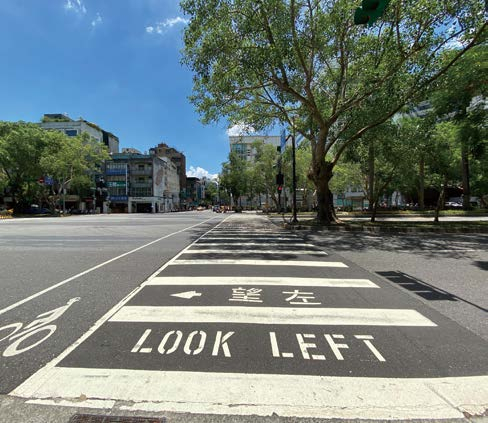
The City’s Department of Transportation proactively selects accident-prone locations within the jurisdiction for analysis. For A1 level accident locations, improve traffic conditions and enhance law enforcements, complete traffic affiliated facilities to provide safety in driving environment for road users. There was a total of 83 A1 level accidents in 2019. All cases were processed within seven days, and 159 engineering and education safety seminar improvements were proposed. Additionally, regular cross-department accident prevention task group meetings were held, to assess progress and efficacy of each unit on accident prevent, to achieve traffic law enforcement.
The Combine Index (CBI) 5 is used to filter accident-prone locations. Every year, improvement outcomes of each quarter from the previous year are tracked. Then by analyzing the causes types of accident, and types of vehicles and collision diagrams for each location, problems can be diagnosed, and identified using the above responsible agencies will be asked to provide reinforcement or improvement measures.
----
5: The Combine Index (CBI) is the sum of Symptom Ratio Index (SRI) and Symptom Severity Index (SSI).
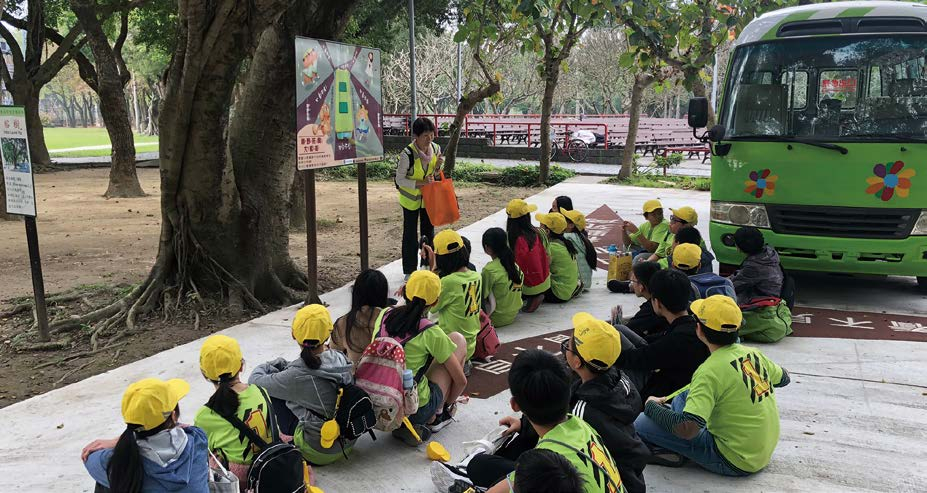
To enhance the public’s concept of traffic safety and road use, various public and outdoor channels are continually used to advocate traffic safety knowledge. “Guardians of Traffic Safety” lectures are conducted to incorporate correct traffic safety concepts into various education campaigns and teaching materials; road safety workshops or publicity campaigns are also customized forthe application. In 2019, 285 lectures were held with a total of 43,106 attendances.
For traffic safety education to take root, the nation’s first outdoor traffic park education zone was inaugurated at Taipei Youth Park in 2018. In 2019, the Jing Chuan Child Safety Foundation was entrusted with preparation of interactive learning manuals, training of volunteers and promotion activities. By integrating park facilities with the physical environment into teaching plans, children will gain deeper understanding of traffic safety through situated learning. In 2019, 41 guided tours were applied by schools and organizations, with a total of 2,476 attendances.
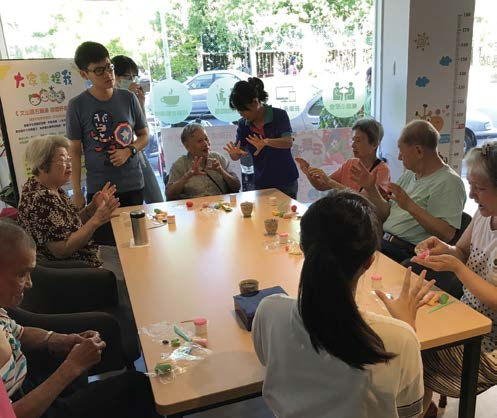
To integrate the expertise of health and social administration units and properly divide labor, to promote an innovative community integrative care service project. Through integrating medical and mobile home services, hospital visits and repeating medications have decreased for the elderly to avoid overconsumption of health care. In times of long-term care worker shortage and limited subsidies, it provided a more comprehensive and convenient medical and care service. Beginning from September 2016, through cross-disciplinary collaboration, resources from the health unit and the social unit were consolidated, and the one-stop window care model was created to provide comprehensive services to the disabled. Responding to the Ministry of Health and Welfare’s long-term care policy in 2018, the community care system was adjusted to provide integrative medical and care services. Integrative services are provided for complex cases requiring cross-disciplinary collaboration, and establish the home carer support service mechanism and construct a network of community resources, and promote long-term care services.
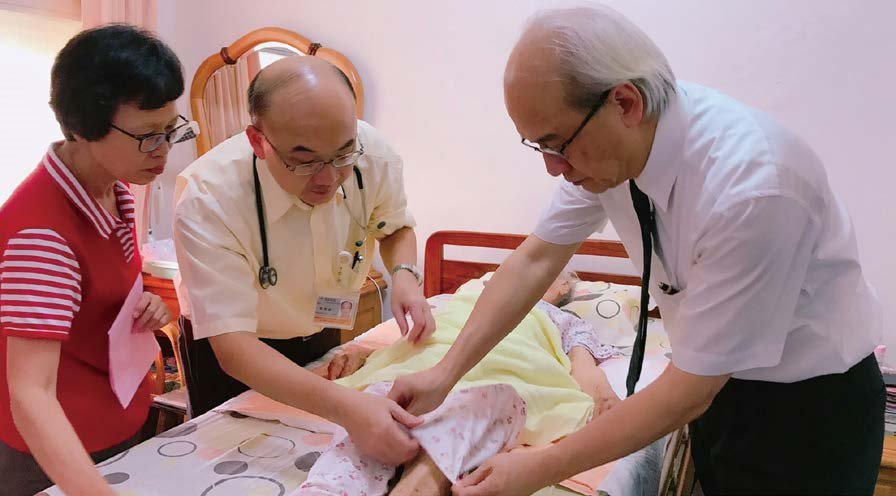
Statistics of all service bases in 12 administrative districts of the City starting from April 2018, the mobile service discovered 1,081 disabled cases in communities, served 1,448 people, online-consulted 6,762 times. Service kiosks were set up in entrusted regions, where health promotion and home carer support activities are held three times a week, totaling 1,417 events with 19,304 attendances. In 2019, the mobile service discovered 1,304 disabled cases in communities, served 1,097 people, online-consulted 13,233 times. Service kiosks were set up in entrusted regions, where disability deferral, health promotion and home carer support activities are held three times a week, totaling 2,283 events with 30,869 attendances, benefitting even more long-term care cases and their families.
In addition to long-term care policies, local health care model is established, and have carried out the Taipei City Family Responsible Physician Care Integrated Plans. In Taipei City, for every 100,000 people, there are 578.6 registered physicians. In 2019, 4,722 cases were admitted, providing more than 12,746 home care/ medical visit services by physician, thereby implementing the integrative care to whole persons, whole families and whole communities.
Integrate non-government resources from medical institutions, medically related associations and NGOs, establish health stops, connect the power of the collective, and work together to “serve the residents, innovate the City”. Actively provide cancer prevention health educations, screenings, referrals or health consultation services, including health risks of betel nuts, regular screening reminder services, promotion of integrative screenings and occupational cancer screenings. Set up “Cancer Screening Management Centers” by combining primary traditional and western medicine clinics and community medical institutions, to provide the public with cancer prevention consultation, screening and referral services, and effectively manage through monitoring and assessments the number of high-risk people doing screenings. Improve cancer screening notifications by utilizing “1-on-1 cancer screening voice reminder notifications” services, sending out E-posts (E-mail service systems), mobile messages to encourage the public to undergo screening so to increase the cancer screening rates. In 2019, 466,364 people completed Pap smear screening, 247,249 did mammography screening, 315,131 underwent colorectal cancer screening. The coverage rate reached 47.33%, which helped to discover early cancer and seek early treatment.
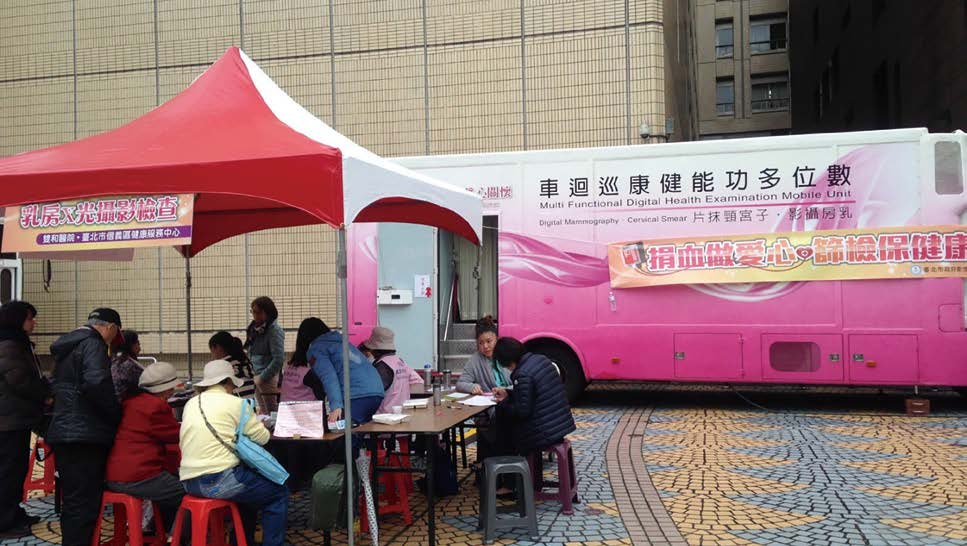
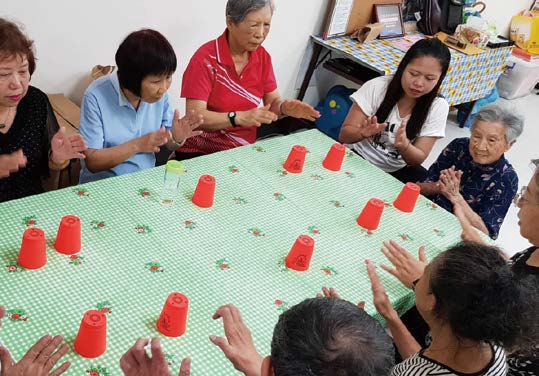
To provide comprehensive, quality and high accessibility dementia medical services, collaborative contracts are signed between seven hospitals and Taipei City Hospital to provide dementia examination, diagnosis and relevant medical services. For over 65-year old residents suspecting dementia cases, provide preliminary screening, confirmation and requirement evaluation services to better manage the cases, as well, register in the City’s dementia case management system in order to enhance the care and quality of life for dementia patients and their families.
In 2019, the Health Centers screened 60,241 people, of which 438 were confirmed, and 629 were suspected cases; the other seven contract hospitals had 838 confirmed and 1,394 suspected cases, totaling 1,276 people confirmed and 2,023 suspected cases, with a diagnosis rate of 63.07%.
